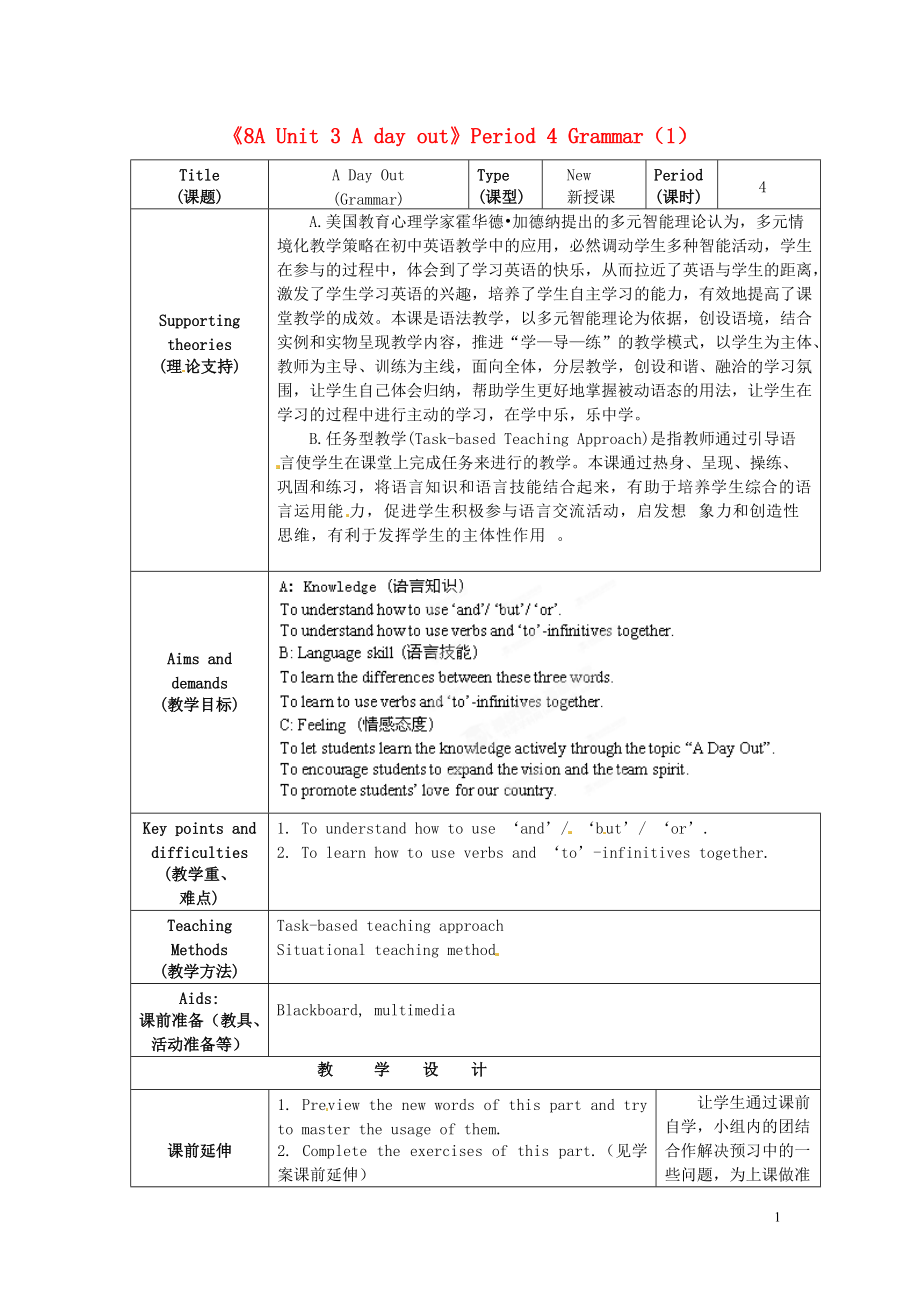《江蘇省海安縣大公初級(jí)中學(xué)八年級(jí)英語(yǔ)上冊(cè)《8A Unit 3 A day out》Period 4 Grammar(1)教案 牛津版》由會(huì)員分享���,可在線閱讀,更多相關(guān)《江蘇省海安縣大公初級(jí)中學(xué)八年級(jí)英語(yǔ)上冊(cè)《8A Unit 3 A day out》Period 4 Grammar(1)教案 牛津版(3頁(yè)珍藏版)》請(qǐng)?jiān)谘b配圖網(wǎng)上搜索���。
1���、
《8A Unit 3 A day out》Period 4 Grammar(1)
Title
(課題)
A Day Out
(Grammar)
Type
(課型)
New
新授課
Period
(課時(shí))
4
Supporting theories
(理論支持)
A.美國(guó)教育心理學(xué)家霍華德?加德納提出的多元智能理論認(rèn)為���,多元情境化教學(xué)策略在初中英語(yǔ)教學(xué)中的應(yīng)用,必然調(diào)動(dòng)學(xué)生多種智能活動(dòng)���,學(xué)生在參與的過(guò)程中���,體會(huì)到了學(xué)習(xí)英語(yǔ)的快樂(lè),從而拉近了英語(yǔ)與學(xué)生的距離���,激發(fā)了學(xué)生學(xué)習(xí)英語(yǔ)的興趣���,培養(yǎng)了學(xué)生自主學(xué)習(xí)的能力,有效地提高了課堂教學(xué)的成效���。本課是語(yǔ)法教
2、學(xué)���,以多元智能理論為依據(jù)���,創(chuàng)設(shè)語(yǔ)境���,結(jié)合實(shí)例和實(shí)物呈現(xiàn)教學(xué)內(nèi)容,推進(jìn)“學(xué)—導(dǎo)—練”的教學(xué)模式���,以學(xué)生為主體���、教師為主導(dǎo)、訓(xùn)練為主線���,面向全體���,分層教學(xué),創(chuàng)設(shè)和諧���、融洽的學(xué)習(xí)氛圍���,讓學(xué)生自己體會(huì)歸納,幫助學(xué)生更好地掌握被動(dòng)語(yǔ)態(tài)的用法���,讓學(xué)生在學(xué)習(xí)的過(guò)程中進(jìn)行主動(dòng)的學(xué)習(xí)���,在學(xué)中樂(lè)���,樂(lè)中學(xué)。
B.任務(wù)型教學(xué)(Task-based Teaching Approach)是指教師通過(guò)引導(dǎo)語(yǔ)言使學(xué)生在課堂上完成任務(wù)來(lái)進(jìn)行的教學(xué)���。本課通過(guò)熱身���、呈現(xiàn)、操練���、鞏固和練習(xí)���,將語(yǔ)言知識(shí)和語(yǔ)言技能結(jié)合起來(lái),有助于培養(yǎng)學(xué)生綜合的語(yǔ)言運(yùn)用能力���,促進(jìn)學(xué)生積極參與語(yǔ)言交流活動(dòng)���,啟發(fā)想象力和創(chuàng)造性思維,有利于發(fā)揮學(xué)生的主體性作
3���、用���。
Aims and demands
(教學(xué)目標(biāo))
Key points and difficulties
(教學(xué)重、
難點(diǎn))
1. To understand how to use ‘a(chǎn)nd’/ ‘but’/ ‘or’.
2. To learn how to use verbs and ‘to’-infinitives together.
Teaching Methods
(教學(xué)方法)
Task-based teaching approach
Situational teaching method
Aids:
課前準(zhǔn)備(教具���、活動(dòng)準(zhǔn)備等)
4���、
Blackboard, multimedia
教 學(xué) 設(shè) 計(jì)
課前延伸
1. Preview the new words of this part and try to master the usage of them.
2. Complete the exercises of this part.(見(jiàn)學(xué)案課前延伸)
讓學(xué)生通過(guò)課前自學(xué),小組內(nèi)的團(tuán)結(jié)合作解決預(yù)習(xí)中的一些問(wèn)題���,為上課做準(zhǔn)備
Teaching Plan
(授課計(jì)劃)
Studying Plan
(學(xué)習(xí)計(jì)劃)
Aims
(設(shè)計(jì)意圖)
課
內(nèi)
5���、
探
究
課
內(nèi)
探
究
學(xué)
StepⅠ
Warm up
溫故知新,自然導(dǎo)入新句型���。
Step II Presentation
1. Ask the students to read some sentences and try to work out the rule.
2. Go through the sentences on page 45 and get them to know the usage of them.
在語(yǔ)境中結(jié)合實(shí)例和關(guān)鍵詞呈現(xiàn)新語(yǔ)言
6���、項(xiàng)目,有利于激發(fā)學(xué)生興趣���。教師引導(dǎo)���、學(xué)生合作探究���。
導(dǎo)
Step III Practice
1. Explain the context of the exercise on page 46.
2. Give them enough time to complete it. If they can’t work it out correctly, they can work in pairs.
3. Ask students to read their answers one by one to see if most students have unde
7、rstood the structure.
采用小組合作探究的形式進(jìn)行���,有利于降低難度���, 培養(yǎng)合作精神。
練
Step IV
Production
Complete some exercises
1. 用and, but, or填空���。
通過(guò)練習(xí)讓學(xué)生對(duì)本課所學(xué)內(nèi)容加以鞏固
學(xué)
Step V
Presentation
1. Ask the students to read some sentences on page 47.
2. Use these sentences as models and try to make more sentences.
8���、在語(yǔ)境中結(jié)合實(shí)例呈現(xiàn)新語(yǔ)言項(xiàng)目,并用造句比賽來(lái)激發(fā)學(xué)生熱情和興趣���。教師引導(dǎo)���、學(xué)生合作探究。
導(dǎo)
Step VI
Practice
1. Explain the context of the exercise on page 46.
2. Give them enough time to complete it. If they can’t work it out correctly, they can work in pairs.
3. Ask students to read their answers one by one to see if most students
9���、 have understood the structure.
采用小組合作探究的形式進(jìn)行���,有利于降低難度���, 培養(yǎng)合作精神���。
練
Step VII
Production
2. 用動(dòng)詞的適當(dāng)形式填空���。
通過(guò)練習(xí)讓學(xué)生對(duì)本課所學(xué)內(nèi)容加以鞏固
課后提升
Step V
Assignment
1.用and, but或 or填空
2.用所給動(dòng)詞的適當(dāng)形式填空
3.選擇填空。
控制作業(yè)量���,作業(yè)既落實(shí)雙基又重視能力���。
Blackboard design(板書(shū)設(shè)計(jì))
Unit 3 A Day Out
words: sunset, possible
10、 grammar:
1
and ( similar )
but ( different )
or ( possibilities可能 or options 選擇)
2
( prepare, hope, want, need, help, learn, decide, agree, plan, fail, choose, stop, begin/start, try, forget, remember, like/love /dislike/hate/would like) to do---
3
 江蘇省海安縣大公初級(jí)中學(xué)八年級(jí)英語(yǔ)上冊(cè)《8A Unit 3 A day out》Period 4 Grammar(1)教案 牛津版
江蘇省海安縣大公初級(jí)中學(xué)八年級(jí)英語(yǔ)上冊(cè)《8A Unit 3 A day out》Period 4 Grammar(1)教案 牛津版

